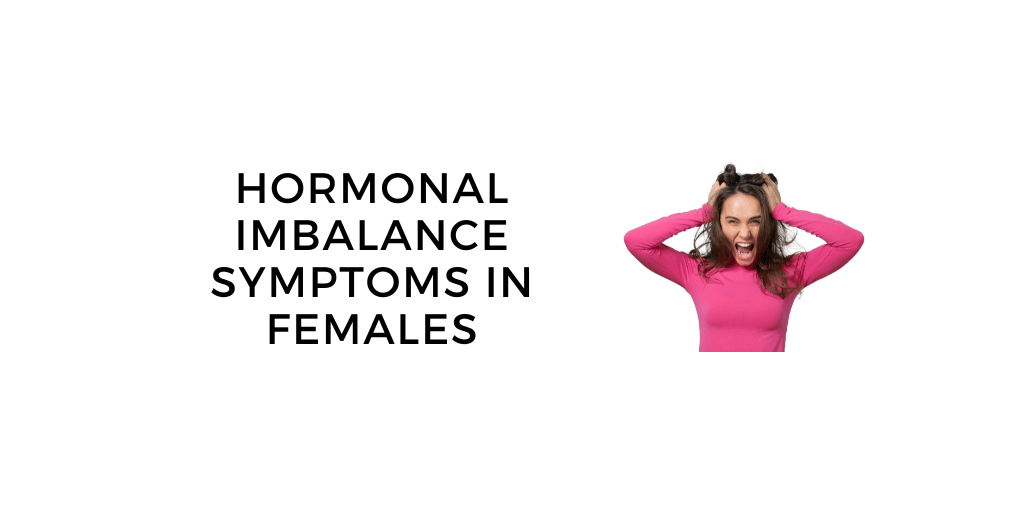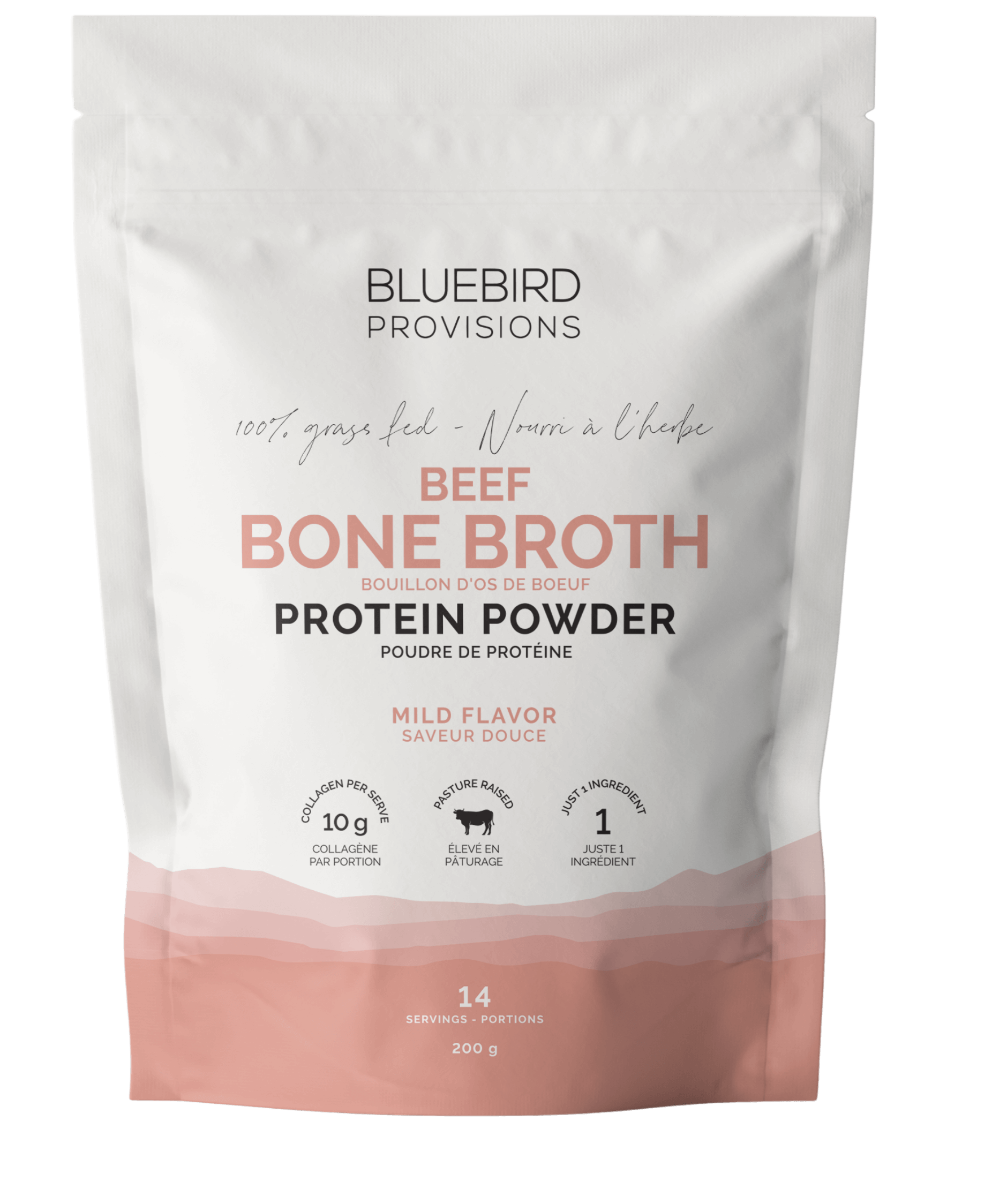
Hormonal Imbalance Symptoms in Females: Causes, Cures and Treatment
Hormonal Imbalance Symptoms in Females
Are you struggling with hormonal issues and wondering what to do? Maybe your menstrual cycle is irregular and you have other symptoms that make you feel out of balance.
If you don't know what is causing your symptoms or how to treat it then you've come to the right place.
Did you know that hormone imbalances are a leading cause of chronic health issues for women of all ages?
If left untreated, these imbalances can lead to serious health problems such as infertility, osteoporosis and even heart disease.
This guide will teach you about the signs and symptoms of hormonal imbalance in women specifically, and how to treat it. With the right information, you can get your hormones back in balance and start feeling like yourself again.
Before we begin I'll mention that a high protein bone broth is a great way to heal your gut. The gut is the cornerstone or health, hormones included.
Bluebird Provisions makes the best one for this because of the high glycine, proline and glutamine.
Ok, let's get started.
What is hormonal imbalance?
A hormonal imbalance is the result of your body having too much or too little of one or more hormones. To take a quick step back, hormones are the body's chemical couriers.
An imbalance can cause or be related to many health conditions or symptoms which I will discuss below.
Where do these imbalances come from? Good question. Different stages of a female's life cause completely normal changes in hormone levels. The common stages are pregnancy, menopause and puberty.
These imbalances can cause many different symptoms, which sometimes means that a larger health issue is present, although this is not always the case. So don't worry if you have some of these.

Common Hormonal Imbalance Symptoms in Females
Hormonal imbalance can cause many symptoms, including bloating, irregular periods, fatigue, irritability, hair loss, palpitations, mood swings, problems with blood sugar, trouble concentrating and infertility.
I'll discuss each of these below.
1. Fatigue Symptoms
Hormone imbalances can often lead to poor sleep and more stress; both of which cause fatigue. Fatigue is often related to thyroid disfunction and specifically thyroxine levels.
Hormonal imbalance testing can detect and diagnose these issues... more on that below.
2. Period Problems (Irregular)
Up to 25% of women experience irregular periods. This means they are not at the same time every cycle or sometimes you feel like you miss a cycle (or multiple) altogether.
But you can also get excessive or lack of periods as well. These are referred to as menorrhagia and amenorrhea respectively.
Finally, some women experience extreme contractions and cramping during their period, which is referred to as dysmenorrhea.
Side note: my wife has endometriosis and experiences extreme pain and discomfort during some of her periods. It is the most debilitating pain I have ever witnessed. So if you have it, I see you and you are not alone. She's found that bone broth, magnesium and a TENS machine seem to help.
3. Fertility Problems
Fertility problems can be related to hormone imbalances for women of all ages. There are a few common disorders that impact fertility which include PCOS (polycystic ovarian syndrome).
Pregnancy is 100% possible if you have PCOS, but you may need to make some changes to do so. There are many treatments to improve fertility, but they are beyond my area of expertise. I would recommend consulting a doctor about these options.
4. Anxiety
Anxiety is the most common disorder in the 'Western' world, but women may be at a higher risk than men. Research tells us that high levels of estrogen leads to fear and anxiety in rodent population (1).
The thing we are learning about anxiety is how much it is related to digestive and gut health. This is because the vagus nerve connects the brain to the gut and sends signals back and forth.
This is the reason why you get get nervous 'butterflies' before giving a speech or have to repeatedly use the bathroom before a track meet as a kid.
Female hormones can particularly disrupt gut bacteria more than some male dominant ones. Learn more about the gut-brain connection and mental health.
5. Muscle Weakness and Joint Pain
You might experience stiff joints or weak muscles. This is because your endocrine system helps to regulate your metabolism and muscle mass as you age.
Oftentimes, these symptoms can be related to thyroid issues, which causes early declines in both testosterone and estrogen.
Muscle size and growth is also related to hyperglycemia (high blood sugar) and hyperinsulinemia (high insulin). I'll discuss these below.
If you experience any of these symptoms, you may need to ask your physician about supplementation options.
6. Skin Issues, Acne and Hair Loss
Skin and hair issues are a common symptom of hormone imbalance, specifically due to thyroid problems, PCOS and ovary disfunction.
Some people think that collagen helps with hair growth, while others do not.
You might also experience dry hair or skin, brittle nails, vaginal dryness, pain during sex and irregular menstrual cycles. Acne in particular can be caused by higher levels or testosterone. But in most cases, you can treat it by using anti-androgen medications and corticosteroids.
7. Trouble Sleeping
Sleep is the hallmark of health and wellness. When it gets disrupted, our health declines. I bring this up because sleep issues is a common symptom of hormone disfunction.
Sleep issues are sometimes related to the HPA (hypothalamic pituitary adrenal) axis. Low levels or progesterone and estrogen is often the culprit. This can lead to an inability to release melatonin or cortisol when you need it.
That's great, but how do I fix it? Read the 11 best foods to help you sleep.
8. PMS and Low Sex Drive
Lack of sex drive is a common symptom as well. There is not a lot of specific advise I have aside from the basic tenets of health, which you already know but I will list anyways.
Sleep, regular exercise and eating an anti inflammatory diet are the three things you can do today to positively effect your hormones and sex drive.
9. Weight Gain or Difficulty Losing Weight
You might also have difficulties losing weight. That is because thyroid hormones like estrogen and cortisol are responsible for running our metabolism which regulates our weight.
PCOS in particular can lead to weight gain. Another health issue called Cushing's disease also leads to weight gain because it causes our bodies to make too much cortisol.
10. Changes in Blood Pressure
Hormones impact heart health, which can cause changes in blood pressure. If you notice any changes then please see a doctor immediately.
11. Puffy or Swollen Face
Cortisol often causes a bit of swelling in the face.
12. Digestive Issues
As I mentioned above, digestion is directly related to circulating hormones and neurotransmitters in our brain and gut. Did you know that 95% of the total serotonin in your body resides in your gut (2)? Crazy right.
It's no wonder that digestion is one of the first issues you notice. But it is so hard to find the cause that we ignore it. To get started, you can learn about leaky gut syndrome.
13. Blood Sugar Control Issues
Cortisol (a stress hormone) is directly related to insulin. When we have too much insulin in our bodies over a long period of time, we may develop insulin resistance, which can lead to diabetes.
Weight loss and lower carb diets can reverse insulin resistance, but also need to prioritize your gut health too.
Causes of Hormonal Imbalance in Women
Causes of hormonal imbalance are stress, bad sleep, thyroid disfunction, menopause, pregnancy feeling overwhelmed and genetics. Many of these causes are out of your control, so be kind and do not blame yourself. This makes things worse.
Your goal is to understand the source of your symptoms as they can guide you to better long term health outcomes.
First, let's talk about stress. Feeling overwhelmed or that your life is out of control is a common cause which I place under the stress category. Stress leads to increased cortisol and negatively impacts your adrenal glands.
While cortisol gets a bad reputation, it is incredibly important to keeping us healthy. The problem is that chronic stress leads to too much of it.
Much of life stress is avoidable, although some is not. Do your best to control what you can control and not stress about the rest.
A regular exercise routine can lower cortisol (3), but you don't need to do things you don't enjoy. Walking, dancing and yard work / gardening, for example, are all fantastic forms of exercise.
Menopause is another common cause. This is the main time when a woman's hormones shift and many women experience weight gain, mood swings, night sweats and diminished sex drive.
Common Hormone Imbalances Women Experience
Common hormone imbalances women experience are PCOS, thyroid disorders, estrogen, prolactin and progesterone imbalances. I'll briefly explain each of these below.
Polycystic Ovarian Syndrome (PCOS)
Polycystic ovarian syndrome (PCOS) affects 10% of women. It is an autoimmune and inflammatory condition that causes small cysts to develop on immature eggs inside the ovaries.
This changes how the ovaries work, can make it harder to conceive, causes acne, skin issues, weight changes and causes reproductive hormones to change significantly.
You might get higher levels of androgens which can also affect different organs in the body. If untreated, you may develop long term health issues.
Thyroid Disorders Like Hypothyroidism
This is a general term which include hypothyroidism, hyperthyroidism and goiter. These disorders can be short term of long term and are often treated using hormone replacement therapy.
- Hypothyroidism is the most common disorder which happens when the thyroid can't make enough hormones for your body to function properly.
- Hyperthyroidism is the result of a thyroid that makes too many hormones.
- Goiter is the enlargement of the thyroid gland. It can lead to the formation of a lump in the front part of your neck.
Don't worry, I'll discuss the treatment options below in their own section.
Estrogen, Progesterone and Prolactin Imbalances
Estrogen imbalances can lead to symptoms like irregular periods, irritability, hot flashes, fatigue, low sex drive, acne, weight gain and PCOS.
Progesterone is made by many organs and can cause many of the symptoms above.
Prolactin imbalances can lead to sensitive nipples, headaches, eyesight changes and fertility problems.
Treatment options like hormone replacement therapy can help to manage your symptoms and rebalance all of these hormones correctly.
How to diagnose a Hormonal Imbalance
Diagnosing a hormone imbalance requires a discussion with your doctor, bloodwork, saliva tests and possibly other tests (MRI, ultrasound, pelvic exam).
Step 1: Recognize the signs and symptoms of hormonal imbalance
If you are experiencing any of the common symptoms like irritability, irregular periods, sleep issues, weight gain, acne that you cannot attribute to other causes, then it may be time to see a doctor or naturopath.
The tough thing is that women are often judged by doctor's and simply told to 'lose weight' before the doctor will take their issues seriously. This is disgusting and needs to stop.
If your doctor is not taking you seriously and simply tells you to exercise and lose weight, I would look for a second opinion from a specialist.
Step 2: See a hormone specialist (Endocrinologist or Naturopath)
The specialist will get you to fill out some lengthy intake forms to get a medical and life history. Do not skimp on the details, as they are important to the big picture.
You may get a physical exam, pelvic exam, blood, urine and saliva tests in order to diagnose a hormone imbalance. Hopefully after this testing you can get a clear diagnosis and treatment plan.
Hormonal Imbalance Treatment Options
The treatment options for a hormonal imbalance include hormone replacement therapy, birth control, anti-androgen medications, vaginal creams, thyroid hormone therapy and a variety of other supplements and medications.
Estrogen therapy
Estrogen therapy is a type of hormone replacement therapy (HRT) that is used in women who have had a hysterectomy, hot flashes, osteoporosis risks or have no uterus (for various reasons).
You have a few different options when it comes to estrogen therapy, these include pills, skin patches, vaginal creams, gels and implants.
Side effects of estrogen therapy include headache, breast tenderness, nausea and vomiting, weight gain and bloating.
Vaginal Estrogen
Vaginal estrogen is a treatment option for vaginal pain and dryness. It is a topical cream that is used locally to help reduce symptoms and eliminates some of the complications with estrogen therapy.
Birth Control
Depending on your background, birth control comes with a lot of baggage, side effects and issues. That being said, it is a treatment option that helps to regulate your menstrual cycles and improve some of your symptoms.
Some types can help improve acne and reduce extra hair on your face and body.
Anti-Androgen Medications
These are used if your test results show that you have high androgen levels. High androgens in women can cause hair loss and lack of growth.
Testosterone Therapy
Used to treat conditions that result in low testosterone. These are more common in males, but also do happen in female bodies. They come in a variety of forms from injections to patches and gels.
Thyroid Hormone Therapy
There are synthetic hormones like levothyroxine, which are used to restore proper hormone balance in specific cases of hypothyroidism. You take it daily and must be closely monitored by an endocrinologist to make sure the dose is correct.
Metformin
Metformin is commonly used in people with type 2 diabetes to help control weight and blood sugar. But it is now used by some to help with PCOS symptoms because it may help lower androgen levels to encourage ovulation (4).
It is worth asking your doctor about, but not the most common standard of care at this point.
Flibanserin (Addyi) and Bremelanotide (Vyleesi)
Addyi and Vyleesi are two medications used for the treatment of low sex drive in women who have not gone through menopause.
This issue is that they come with side effects that include nausea and blood pressure changes.
Eflornithine (Vaniqa)
Eflornithine (Vaniqa) may help those suffering with facial hair growth.
What is the hormone replacement therapy for hormonal imbalance in females?
Hormone replacement therapy (HRT) is using synthetic hormones via injections, patches, gels and pills to treat the nasty symptoms associated with hormonal imbalances in females.
HRT can help you feel better by getting the right hormone balance when you need it most.
A new class referred to as bioidentical hormone replacement therapy (BHRT) specifically helps to restore hormones to their natural level.
It involves pellets being inserted under the skin or in the vagina that gradually release hormones the way a female body would. They begin to release with in minutes after insertion.
This will eventually relieve any physical symptoms you are having such as hot flashes, irritability or sleep issues.
What are the side effects bioidentical hormone replacement therapy?
Bioidentical hormone replacement therapy can cause a number of side effects, including loss of libido, irritability, weight gain and discomfort during sex.
It is best used under the close supervision of a doctor or naturopath in the correct dose based on your genetics and hormone testing results.
Closing Thoughts
If you’re experiencing hormonal imbalance symptoms, there are a number of things you can do to find relief.
Three places to start are by eating an anti-inflammatory diet, exercise (if you don't already) and managing stress.
The most potent anti inflammatory food is bone broth, but you can't trust many of them.
Bluebird Provisions has all of the anti inflammatory and healing amino acids to help heal your damaged gut. You can find them on their website or on Amazon.
If these lifestyle changes don’t help, talk to your doctor about hormone therapy or other treatments.
Have you treated a hormonal imbalance? What helped? Or have you tried things that did not help? Leave a comment and let and my readers know. We would love to hear your experience.
Disclaimer: this information is for educational purposes only, is not medical advise and has not been evaluated by the FDA or CFIA. It is not intended to diagnose, treat, cure, or prevent any disease. Please consult your primary care physician for advise on any of this.
Sources
(1) https://www.ncbi.nlm.nih.gov/pmc/articles/PMC4757430/
(2) https://www.ncbi.nlm.nih.gov/pmc/articles/PMC6469458/
(3) https://pubmed.ncbi.nlm.nih.gov/18787373/
(4) https://pubmed.ncbi.nlm.nih.gov/28865539/
















Leave a comment
This site is protected by hCaptcha and the hCaptcha Privacy Policy and Terms of Service apply.